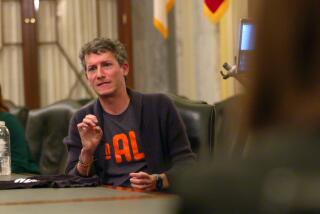Benefiting AIDS Groups With a Non-AIDS Theme : Movies: Howard Cushnir parlayed donations of time and equipment into ‘Sexual Healing,’ a film good enough for Showtime.
- Share via
Howard Cushnir made some money writing screenplays but, like many screenwriters, what he really wanted was to direct. He decided to finance his own movie--but only had enough to make a rough demo reel. And he felt guilty asking dozens of film professionals and vendors to donate time and products just to benefit his career.
Turning the project into a charitable event solved both his problems.
Cushnir, 32, could offer no guarantee that the film, “Sexual Healing,” a 40-minute movie about two people who meet via a 900 phone sex line, would ever make any money for AIDS charities. But with donated material, he was able to parlay $50,000 he’d earned from selling an as-yet-unproduced screenplay into a budget that he estimated would have been about $400,000 had he paid full price.
“Making it as an AIDS benefit certainly helped me because suddenly a lot of people had a reason to be involved in it other than just doing it to help me,” Cushnir said. “So many people in Hollywood are really frustrated because they know so many people around them who have AIDS, who are dying of AIDS and they don’t really feel like they can do anything about it.
“So, as soon as we started to say this was an AIDS benefit, people started donating all kinds of stuff. We got lighting equipment and film stock and a 40-foot semi. Even some Teamsters who were sitting at home on disability waiting to get better would come and kind of limp onto our set and stay all night driving or guarding the trucks.”
The free services enabled him to make a film that looked good enough for Showtime to buy it.
“I thought the product stood alone on its own creative merit and if it wasn’t something that we could be proud of, I never would have gotten it through the system,” said Dennis Johnson, Showtime’s senior vice president of original programming. “But the fact that he had chosen a way to make a difference and create awareness of this disease made it a way for us as a network to contribute money and find a quality, promotable product at the same time.”
Showtime, which will air the film early next year, gave Cushnir about $75,000 to cover his costs to date and for additional post-production expenses. Cushnir also persuaded Showtime to donate an additional $25,000 to several AIDS charities still to be determined.
Cushnir retained a 50% interest in all subsidiary sales to European television and home video; all of that money also will be donated to AIDS charities, he said. He estimates that the total contribution could reach $100,000.
Interestingly, the film itself has nothing to do with AIDS. It tells the story of two lonely, sexually frustrated people--played by Anthony Edwards (“Top Gun” and “Northern Exposure”) and Helen Hunt (“Mad About You”)--who turn to a phone sex line as a last resort.
“I picked this topic both because the 900 lines are booming all over the place and it seemed like the perfect metaphor for the sexual climate in our country in that you have instant intimacy about your most private fantasies and concerns and yet you are totally isolated at the same time,” explained Cushnir.
“And I thought that could really have existed only in the age of AIDS because, in fact, what is phone sex if not the safest sex imaginable?”
The film is “really a story about people trying to connect in this very isolating age we live in,” Cushnir added.
Showtime’s Johnson believes that using a non-AIDS story to benefit AIDS might actually make it harder to dismiss.
“I don’t think we should ghettoize AIDS,” he said. “It’s a human concern. And I believe that anytime we can be involved in a project that will raise awareness about it, whether you are doing ‘Dracula’ or anything else, so be it and thank God. It doesn’t have to be a story about a person with AIDS. People without AIDS have to start making a difference too.”
The story and character first attracted Anthony Edwards, who has been friends with Cushnir for many years, to the project. Helping the fight against AIDS was simply gravy. He jumped to do it, even for no pay, he said, because it is rare to find a story “that deals with sexuality, communication and identity in such a fascinating way.”
He was enthused by “this tremendous outpouring of great technical talent. Guys I knew who make big bucks on big-budget movies were showing up just to push the dolly for a couple of days. And that was sweetly reaffirming to see that the cutthroat money aspect which tends to dominate so much of the way things are in this business is not why we are all doing it.”
As for Cushnir, he’s hopeful that the project will get him some attention as a filmmaker.
“It’s very difficult for someone who has not made movies that made a lot of money to break through. And I’m very proud of this, because if I found a publicity stunt that gets me going as a director but also raises $100,000 for AIDS charities and also gets over 100 people working on something that they believe in, that’s the greatest publicity stunt that I could imagine.
“And anyone who might give me another job still has to like the film. If they hate the movie, the gimmick--quote unquote--won’t mean a thing.”
More to Read
Only good movies
Get the Indie Focus newsletter, Mark Olsen's weekly guide to the world of cinema.
You may occasionally receive promotional content from the Los Angeles Times.










